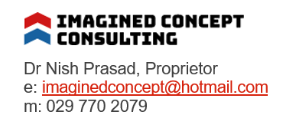Leadership · Insight · Knowledge
Welcome to the Institute of Internal Auditors New Zealand, the professional body for internal auditing

Internal auditing is increasingly advancing to become a vital component of organizational control. Despite the importance of an internal audit function (IAF), little is known about IAF effectiveness, or lack thereof. To this note, various academic studies have described IAF effectiveness as an underexplored ‘black box’!
In my doctoral thesis (completed at ‘The University of Auckland’ in 2020), I carry out a mixed methods study to provide insights on IAF effectiveness using data from the New Zealand setting. By exploring the realms of the unfamiliar, the black box concept is opened a little through a multi-method study aimed to offer fresh insights on IAF effectiveness.
Some confronting remarks:
i. “...there are indications of an apparent expectation gap between role of an IAF, the expectations borne by its key stakeholders (delivery against which is a major determinant of IAF effectiveness) and performance evaluation mechanisms applied to measure IAF effectiveness.”
ii. “There are large variations in IAF ‘audit to consulting activities mix’ across the sample firms which heightens the threat to IAF independence - particularly as IAFs shift towards a business partnering ethos.”
iii. “IAF serves more than one master who often have competing expectations. IAFs role in serving at least two masters creates a risk that a strong association with management may compromise IAF independence.”
iv. “…for the IAF to sustain its relevance and continue to deliver value, there is a need for a radical shift to its service proposition.”
Where the traditional model focussed on compliance and, predominantly, financial risk, the future IAF demonstrates business partnering to provide assurance over material and strategic business risks. The future IAF will be more commercial, more focused on material organisational risks, more focused on outcomes and less on processes. To be effective, IAFs need to have an awareness of key stakeholder expectations, focus on continuous internal development by capturing and practicing lessons learnt, innovate to embrace data analytics and leverage relationships to generate commercial insights.
After completing a conjoint honours degree in Science and Commerce, I was looking to gain exposure to financial reporting processes as well as to understand how different businesses operated across numerous industries. In my first role as an ‘External Auditor’ at Deloitte, I soon came to realise the origin of ‘audit’ from the Latin word ‘auditus’, which translates to mean having been listened to. Audit is a field that relies heavily on conversation and enquiry procedures. At the outset, a good advice for audit professionals lies within the observation that we have two ears and one tongue (so that we would listen more).
I have since held a number of risk, compliance and assurance roles where I developed strong professional skills in audit and assurance, financial risk management and governance. These skills were developed throughout my career in professional services, not for profit charitable entity, global manufacturing and distribution, and banking. I am currently a ‘Senior Assurance Manager – Finance’ at The Bank of New Zealand where I support the bank with internal controls to ensure 'numbers reported in external reports are accurate and complete'. I am also an active academic researcher with a focus on assurance and internal audit and have recently published academic articles in reputable accounting and finance journals.
I became passionately interested in academically investigating IAF effectiveness after transitioning from the relatively more structured and regulated external audit environment to the voluntary risk based internal audit setting. I soon came to realise that there was limited academic focus on factors that create and enhance IAF effectiveness. In performing detailed case level analysis, via semi-structured interviews with the Heads of Audit and Senior Management, I investigated IAF effectiveness from both a demand and a supply perspective. This study is one of only a few with a research design that considers value of IAF, and it is the first in the NZ setting to interview the both the “buyer” and “seller” of IAF services within the same organisation to capture the lessons and understanding of IAF effectiveness.
In my lectures to the final year commerce students at The University of Auckland, I often put spotlight on the quote “soft skills are today's hard skills”. Anyone can develop the technical skills - but the leadership skills really need to be nurtured. I’m convinced that is actually the key to success of any internal audit function. Soft skills, such as clear communication, influence, relationship management and development, leadership and resilience, are crucial for the IAF to cultivate trust and respect within the organisation. Those are the hard skills of today.
Dr Nish Prasad, CA
Senior Assurance Manager | Finance
Bank of New Zealand
|
|

|